Rieder’s Richter Scale: Caeleb Dressel Transcendent in Repeat Threepeat
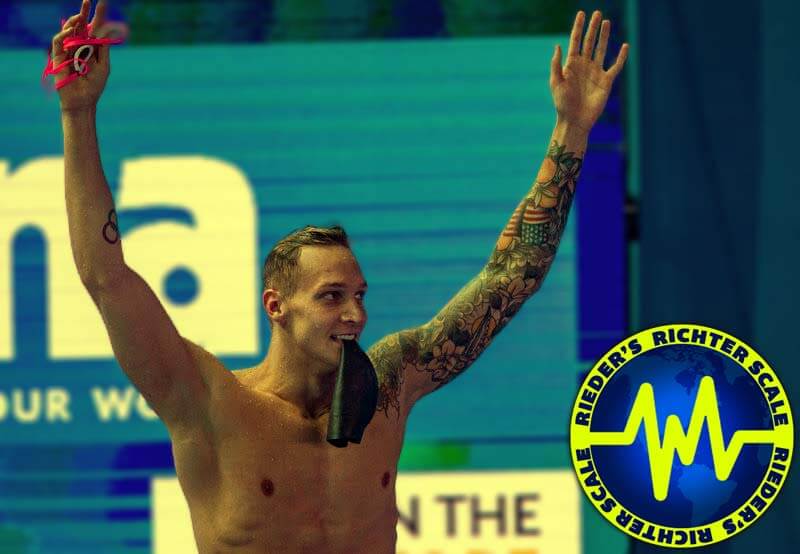
Editorial content for the 2019 World Championships coverage is sponsored by FORM Swim Goggles.
See full event coverage.
Follow FORM on Instagram at @FORMSwim #swimwithform

Each day during the FINA World Swimming Championships, Swimming World will present “Rieder’s Richter Scale,” an analysis of the impact of each swimming final on the sport’s wider landscape: “1” indicates just a minor tremor, while a “10” means a race brought massive upheaval. Caeleb Dressel
On July 29, 2017, Caeleb Dressel won three gold medals in the span of two hours in Budapest. That was the night he became a superstar, when he officially claimed the mantle of world’s best male swimmer. When he repeated that feat 728 days later in Gwangju, the world shrugged. He’s become so good and so dependable that we are almost ready to take his achievements for granted.
When he won the 50 free, 100 fly and mixed 4×100 free relay in Budapest, Dressel somehow managed to swim basically his best time in all three: 21.14 in the 50 free, a 49.86 in the 100 fly that missed the existing world record by just four hundredths and a 47.22 leading off the relay, five hundredths off his lifetime best from the individual 100 free final two days earlier.
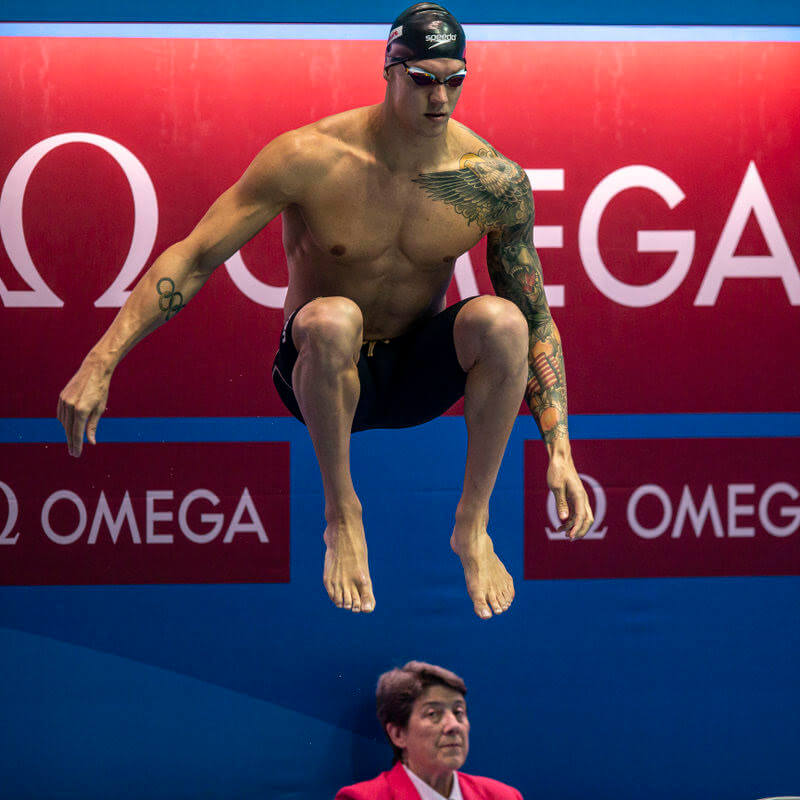
Photo Courtesy: PATRICK B. KRAEMER
This time, at least, Dressel showed some humanity. Beginning with the 50 free, Dressel briefly looked as though he might be able to crack another decade-old world record, Cesar Cielo’s 20.91 from the last moments of the shiny suit era. Alas, Dressel missed just barely, although his 21.04 marked the fastest time ever in a textile jammer and the fourth-fastest swim ever notched.
Most shockingly, he won by 0.41, compared to the 0.36 that separated co-silver medalists Bruno Fratus and Kristian Gkolomeev from eight-place finisher Shinri Shioura.
Moments later, Dressel returned to the pool for the 100 fly, and sure, he had crushed Michael Phelps’ world record in the semifinals with his eye-popping 49.50, but Kristof Milak surely had the ability to challenge Dressel after that ridiculous 1:50.73 world record in the 200 fly. However, Milak couldn’t get out with Dressel, and he even struggled on the back end, resulting in a fourth-place finish in 51.26, far away from his silver medal-winning 50.62 from two years ago.
For perhaps the first time in Dressel’s career, you could sense a bit of fatigue as he went out in 23.09, behind his world record split of 22.83. No matter: Dressel closed quicker than in the semis, and his 49.66 was still quicker than Phelps’ previous mark from Rome.
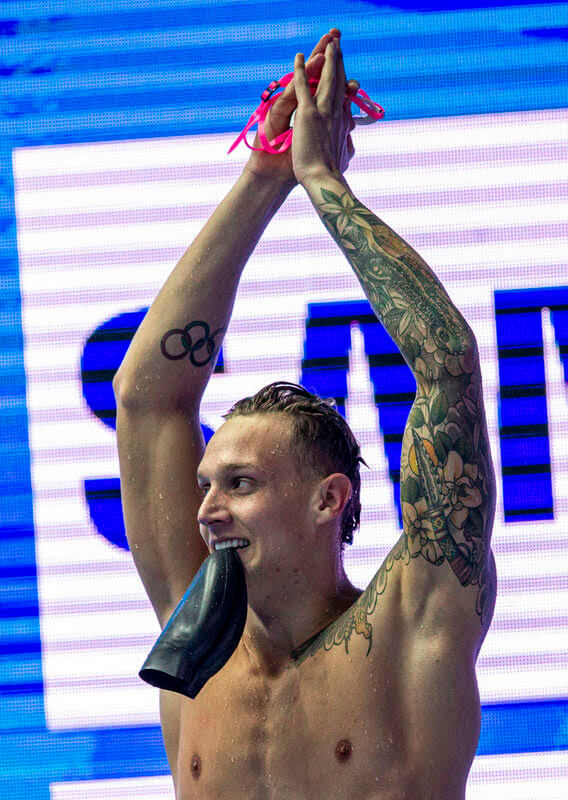
Photo Courtesy: PATRICK B. KRAEMER
As Dressel took just a few moments to raise his arms in celebration as he climbed out of the pool, the powers-that-be awaited. Literally. The 50 free medal ceremony had to be delayed as Dressel dried off and donned his warm-up gear to receive his first medal of the evening.
Finally, he finished off the night with another mixed relay leadoff, and you could really see the cracks showing through this time as he sluggishly flipped at the halfway point. Dressel couldn’t touch his 46.96 from the individual 100 free final, but he still managed to hold off Kyle Chalmers—he of the 100 free Olympic gold medal—and put the U.S. in front by three hundredths.
Some stats: Dressel is now the second man to sweep the 50 and 100 free at multiple World Championships, joining the likes of Russian great Alexander Popov. He’s just the fourth to win four individual titles at one Worlds, joining Phelps (2007), Ryan Lochte (2011) and Katie Ledecky (2015).
And oh yeah, he won three world titles in one night, joining the company of… himself.
“It was not easy in ’17, and it was not easy this year,” Dressel said. “I don’t want it to be easy. I really don’t.”
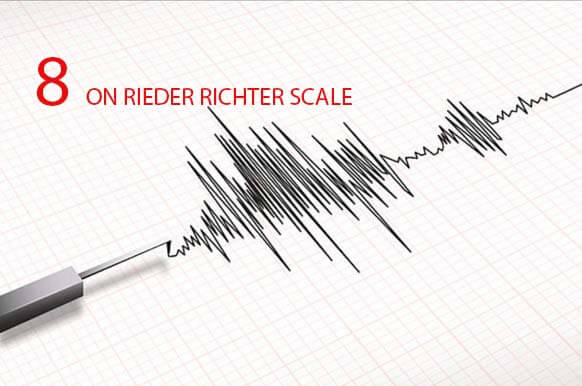
With one night to go in Gwangju, the U.S. men will be slightly favored in the 4×100 medley relay, giving Dressel a chance to win a seventh gold medal and match a Phelps record that he first tied two years ago. Moreover, an eighth overall medal would be the most ever by a swimmer at one World Championships.
On night seven, Dressel briefly celebrated each of his gold medals, and then it was on to the next. That’s just how he operates—and that’s why he’s seemingly always ready for the next huge moment. For now, give Dressel his due for another night in which he took ownership of the World Championships. That records an 8 on the Richter scale.
In her illustrious career, Katie Ledecky has won 15 individual golds between the Olympics and World Championships, along with a haul of other top honors from U.S. Nationals, the Pan Pacific Championships and NCAA championships. And it’s no hyperbole to call her latest gold, the 800 free title in Gwangju, the most impressive of them all.
Because for years, Ledecky won races by being faster than anyone else, plain and simple. She trained, she showed up on race day, and she executed to perfection, never better than at the 2016 Olympics, when she won gold in the 400 free by almost five seconds and in the 800 free by more than 11.
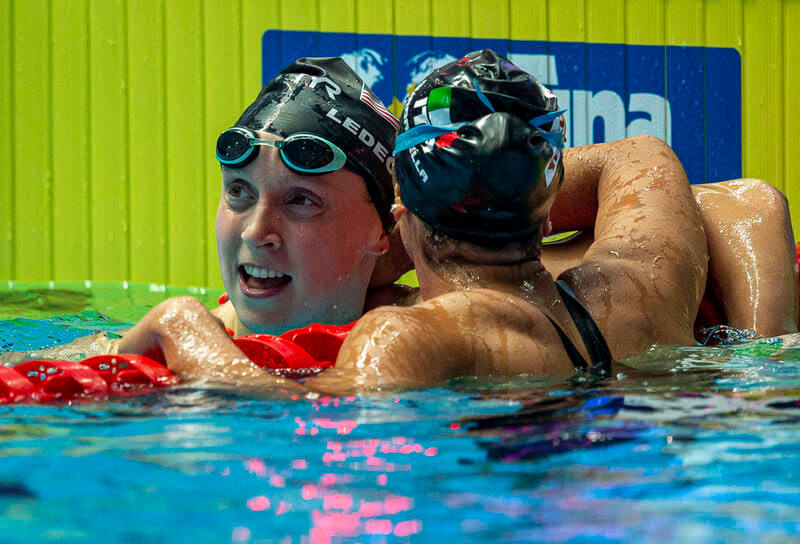
Katie Ledecky soaks in the result as Simone Quadarella congratulates the toughest opponent of them all in distance free – Photo Courtesy: Patrick B. Kraemer
This week in Gwangju, she got sick, so sick that she had to withdraw from both the 200 free and 1500 free. Even before that, she looked a far cry from her best self as she shockingly faded to silver in the 400 free. After returning for the 4×200 free relay to help the U.S. women earn silver, her 800 prelims swim seemed to completely tax her as she qualified second behind U.S. teammate Leah Smith.
By that point, anyone who doubted whether Ledecky really had been sick was eating their words. Sure, she was feeling better, but the effects of being sick don’t simply vanish. She wouldn’t be swimming the 800 free final at 100 percent, like she had in Rio or plenty of other times before that.
So to compensate, Ledecky swam the grittiest race of her career. She went out quick and took an early lead over China’s Wang Jianjiahe. Then came Simona Quadarella, the Italian who won the 1500 free in Ledecky’s absence. Quadarella crept up and kept on coming, taking the lead at the 450-meter mark and extending the advantage to eight tenths at one point.
Ledecky responded. She never backed down. She picked up her pace, and with 100 meters to go, Quadarella’s lead was down to a tenth. Off the final turn, Ledecky shifted into one final gear, and that was it. She would win her fourth straight world title in the 800 free.
Ledecky touched the wall in 8:13.58, far slower than her title-winning times from 2015 and 2017 and just a tenth faster than her time from her first golden swim in 2013. The winning margin, which ballooned to 1.41 seconds, was by far her smallest in any 800 free championship race.

Not that any of that matters in the least. Because in perhaps the biggest test of her career, the first time anyone really doubted her, Katie Ledecky showed her true colors: physical and mental toughness far beyond what almost any other human can comprehend. We learned more about Ledecky’s inside makeup in one race than in the previous seven years combined.
For that, the women’s 800 free final blasts the Richter scale to the tune of an 8.
After taking down Missy Franklin’s 200 back world record in the semifinals, Regan Smith said that she “was looking to see where I could take it.” As if there might be more in the tank.
In the end, yes, maybe the 17-year-old went out a little too fast in her first moment as a favorite in a major final. She split 59.45 to the feet at the halfway point, which would have been the world record in the 100 back as recently as 2006 and surpassed the times of three swimmers in the individual 100 back final.
Smith had gone out in 1:00.37 on her way to the 2:03.35 in the semifinal, so she was almost a full second under world record-pace. For some historical perspective, Franklin was out in 1:00.50 on her way to the 2:04.06 that stood as the world record until Friday. Kirsty Coventry, when she set her quickest shiny suit world record at 2:04.81, went out in 1:00.91. And when Emily Seebohm won the 2017 world title, she went out in a mere 1:01.72.
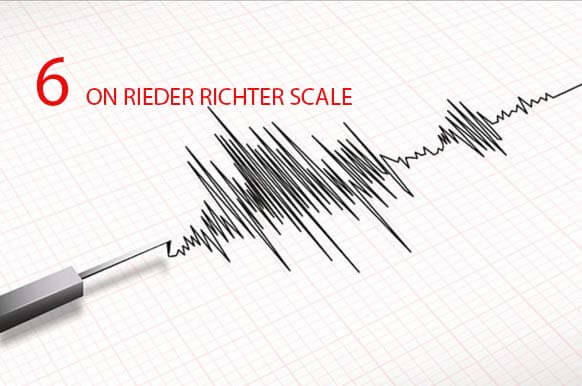
So yes, this was historic speed, and Smith undoubtedly paid the price down the stretch as she ended up falling just short of her new world record. No matter: She won the gold medal by 2.57 seconds. And if it’s not abundantly clear yet, Smith deserves the chance to lead off the U.S. women’s 4×100 medley relay, even if she didn’t get the chance to swim the 100 back in Gwangju.
For this world title and follow-up to a world record, Smith records a 6 on the Richter scale.
One day after Ledecky’s defeat in the 400 free, Sarah Sjostrom suffered a similar surprising setback in the women’s 100 fly, as 19-year-old Canadian Maggie MacNeil swam past her down the stretch of the 100 fly. (If that seems like forever ago, just remember, it was five days ago.)
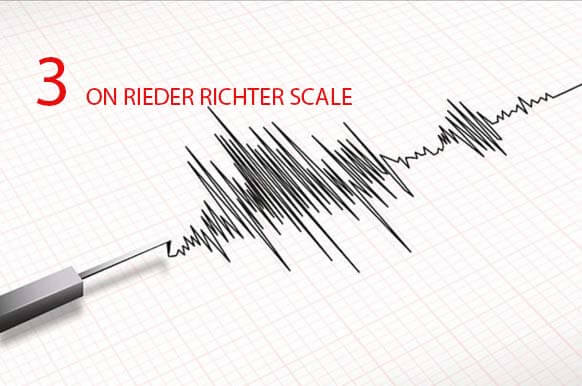
After two bronze medals in the 200 free and 100 free, Sjostrom finally returned to the top of the podium in the 50 fly, her first gold medal of the week, albeit in a relatively inconsequential event in the wider picture. Sjostrom now owns the top 16 performances of all-time in the 50 fly, and the gold is her ninth individual honor at a major championships.
The swim records just a 3 on the Richter scale, but that matters not to Sjostrom. In the medal ceremony afterwards, as she again stepped onto the gold-medal podium once again after so many titles over the last decade, the 25-year-old Swede smiled widely. Yet another gold medal still meant quite a bit.
To finish off night seven in Gwangju, the U.S. took the win over Australia in the mixed 4×100 free relay, the third of Dressel’s aforementioned seven gold medals. The gold marked the fifth of the night for the Stars and Stripes, almost half of the 11 total golds this week as the Americans have come on strong after a sluggish start to the meet.
But consider that Australia rested Cate Campbell, one of the finest relay swimmers ever, and finished just a half-second behind the Americans. Surely, Campbell could have fired off another 51-second in a spot, the anchor, where she has become so comfortable, but the Australian team chose to rest their ace instead of competing in the relay, still not an Olympic event.
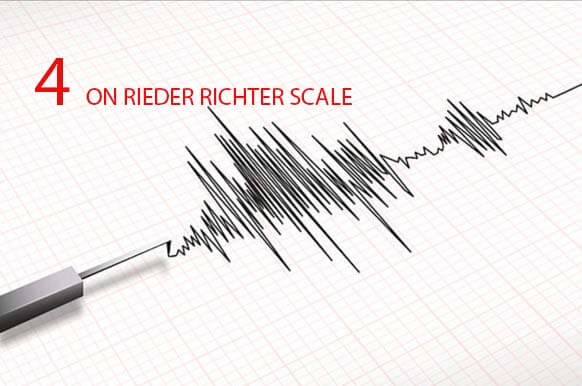
But Kyle Chalmers, Clyde Lewis, Emma McKeon and Bronte Campbell, younger sister of Cate, still picked up the silver, giving the Aussies four gold, a silver and a bronze in six relays this week. In comparison, the 2017 Aussies won just four relay medals, none of them gold, for the entire week. On the medal table, Australia now owns 17 medals this week, well up on 10 from both Budapest 2017 and Rio 2016. The frontrunning Americans sit only five ahead, with 22.
So heading into the final day of the pre-Olympic year World Championships, Australia sits closer to the United States in swimming firepower and accomplishment than it has in years. A U.S. mixed relay gold and an Australian silver record a 4 on the Richter scale.
Read more about the FINA World Swimming Championships. Caeleb Dressel
.jpg)

- 2017 WORLD CHAMPIONSHIPS
- OFFICIAL MEET PAGE
- WATCH RACE VIDEOS
- LIVE STREAM
- DAY 1 SWIMMING RESULTS
- DAY 2 SWIMMING RESULTS
- DAY 3 SWIMMING RESULTS
- DAY 4 SWIMMING RESULTS
- DAY 5 SWIMMING REULTS
- DAY 6 SWIMMING RESULTS
- DAY 7 SWIMMING RESULTS
- DAY 8 SWIMMING RESULTS
- RESULTS FOR ALL AQUATIC SPORTS
- DAY 8 PRELIMS HEAT SHEETS
- DAY 8 FINALS START LISTS
- FORM Swim for Coaches
- FORM Swim Sponsorships
- FORM Swim Contests
- FORM Swim Media




Mara Guevara
Valerie Gayle Uy Sobrang excited na ko for the Olympics!!! Kaso sobrang mahal ng tickets.
Mara Guevara their first time without Phelps too. Not sure if Lochte will make it by then
Super di ako fan ni Ryan Lochte kaya keri lang. hahaha
Mara Guevara but he brings in the ?
Valerie Gayle Uy Tignan natin how he fares next week.
Looking at the statistics of the medalists so far, the younger women appear to be doing better than the younger men.
Here is the age distribution of the male medalists:
17: 1
19: 1
20: 2
21: 2
22: 8
23: 4
24: 5
25: 3
26: 2
27: 3
30: 1
33: 1
36: 1
39: 1
The distribution skews to the left. 4.65% of the medals go to under 20, 60.47% go to 20-24, 25.58% go to 25-29 and 9.3% go to over 29. The last batch of young swimmers have reached maturity and are reflected in 60.47% figure. The next batch of young swimmers have not come yet.
This is the age distribution of the female medalists:
16: 1
17: 2
18: 2
19: 2
20: 1
21: 1
22: 5
23: 2
24: 3
25: 4
26: 2
27: 2
28: 2
30: 2
This skews more to the right. 20.93% of the medals go to under 20, 39.53% go to 20-24, 32.56% go to 25-29 and 4.65% go to over 29. The new batch of young swimmers are already here and are bound to reach maturity within the next 5 years.
The cycles of male and female swimmers are not in sync. The male cycle is a bit ahead. The 20-24 male should peak in the Tokyo Olympics but the 20-24 female should kept low. The 20-24 male should kept low in the Olympics after that and the 20-24 female should peak in that Olympics.
The young male medalists in this Worlds are Kristof Milak, Kolesnikov, Andrei Minakov, Ivan Girev, Jack LeVant and Maxime Grousset. The young female medalists in this Worlds are Regan Smith, Titmus, Oleksiak, Daria Vaskina, Minna Atherton, Kaylee McKeown, Margaret MacNeil, Kayla Sanchez, Taylor Ruck, Rebecca Smith, Emma O’Croinin, Freya Anderson and Benedetta Pilato.